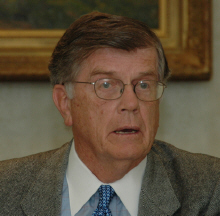TechNet: 'Nuclear world is a green world'

TechNet, a bipartisan, political action group of high tech senior executives that promotes the growth of technology and innovation, hosted a dinner last night in Palo Alto to discuss some of its agenda items, which have included stances on education, patent reform, stock options and broadband and Internet policy.

Currently, nuclear accounts for about 20 percent the energy supply, Kvamme said, and that level will need to be maintained to make progress, he said. The Energy Policy Act of 2005 has provisions for new nuclear power plant as well for investment in biofuels, such as ethanol and butanol. Kvamme likened the biofuel debate, as to which substance would dominate it to the early days of Silicon Valley, when the germanium and silicon were vying to be the of the semiconductor industry. Ethanol may end up being germanium, but the jury is still out.
Doerr, who invested in Google, Amazon, Sun and other major hits, and many others in the VC community are betting heavily on green technologies as a next major profit windfall.
Sarbannes-Oxley and HB1 visas also came under fire from the group at dinner. SOX has had an adverse effect on companies going public, which the VCs don’t appreciate, and the one size fits all regulation penalizes small- and medium-sized companies. As a result, there are more mergers and acquisitions as liquidity events, and companies are going public on foreign exchanges, such as London Stock Exchange. "SOX is a gross overreaction, especially around the definition of 'materiality,'" Doerr said. "It is the accountants full-employment act."
Robert Grady, who heads the Carlyle Groups VC fund and is president of the National Venture Capital Association, said that 25 percent of companies that have recently gone public have at least one founder who is foreign born. For high-tech IPOs, the number is 40 percent. "We are closing the door to the best minds," said Aart de Geus, CEO of Synopsys.
Stay tuned for coverage from the TechNet Innovation Summit at Stanford University, where Charlie Rose will talk with Bill Gates, John Doerr, Jerry Yang, Scott McNealy and other high-tech executives.